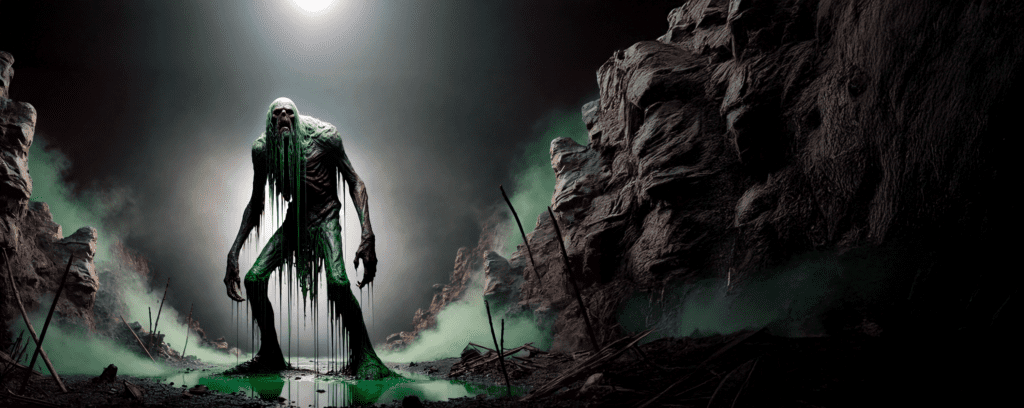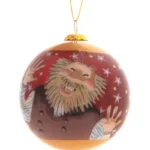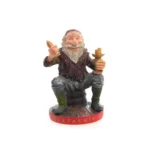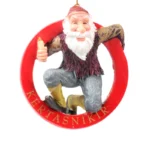Glussa-Leggr – Slime Leg

“Glussa-Leggr slithered through the cold night air, his pockets stuffed with greasy treasures, leaving nothing but a slick trail in his wake.”
Introduction
Glussa-Leggr, also known as the Fat Stealer, is one of the more grotesque and unsettling Yule Lads. His obsession is with fatty foods, particularly butter, grease, and rich cuts of meat—precious commodities during Iceland’s brutal winters. Unlike his brothers, who often steal for mischief or sustenance, Glussa-Leggr’s actions are driven by a gluttonous greed that leaves destruction in its wake. He sneaks into homes late at night, stuffing these rich, greasy morsels into his oversized pockets, boots, and even clothing, ruining supplies that families desperately need to survive the long winter months.
Historical Background and Earliest Known Reference
The character of Glussa-Leggr likely originated in older Icelandic folklore, where survival during the harsh winters depended on careful food storage and rationing. Fat and grease were essential not only for cooking but also for keeping warm, as they provided much-needed calories and energy. His name, “Glussa-Leggr,” directly translates to “Fat Leg” or “Slime Leg,” alluding to his filthy, grease-covered appearance after his nightly raids. The earliest references to Glussa-Leggr come from oral traditions passed down in rural farming communities, where he symbolized the dangers of greed and waste in times of scarcity.
Physical Appearance and Clothing
Glussa-Leggr is often depicted as a grotesque, hunched figure with a constantly greasy appearance. His clothing, typically made of ragged wool and animal skins, is stained and covered in fat, as he stuffs his pockets and boots with the stolen spoils of his nighttime raids. His face is gaunt and his fingers are long and slimy, perfect for snatching slabs of butter and chunks of meat from the larders of unsuspecting homes. His most notable feature, however, is the slick, greasy trail he leaves behind, marking his presence in the homes he visits.
Likes, Dislikes, and Habits
Glussa-Leggr has a singular obsession: fat. Butter, grease, and fatty cuts of meat are his greatest delights, and he will go to any length to steal them from unsuspecting families. His raids are always stealthy, and he takes just enough to leave behind a mess that renders the remaining supplies unusable. He dislikes lean foods, such as vegetables or grains, and has no interest in anything that isn’t rich in fat. Households that guard their food stores carefully are his biggest frustration, as they make it harder for him to indulge in his gluttonous habits.
Types of Pranks and Mischief
Glussa-Leggr’s pranks are more destructive than playful. While other Yule Lads might steal sausages or lick spoons, Glussa-Leggr’s raids often ruin entire food stores, leaving families with nothing but spoiled, greasy remnants. His favorite trick is to stuff fat into clothing—particularly socks and gloves—ruining them and making them unusable during the winter months. By the time the family discovers his handiwork, their most precious supplies have been wasted, and they’re left to face the winter with diminished resources.
Relationship with Humans and Other Yule Lads
Glussa-Leggr’s relationship with humans is one of fear and disgust. His presence is never welcome, as it often signals a loss of vital food supplies during a time when every scrap is needed for survival. He is viewed as a symbol of waste and greed, taking more than he needs and leaving behind a mess for others to clean up. Among his brothers, Glussa-Leggr is often seen as the most selfish and gluttonous, caring only for his own indulgence. His closest allies are other food-focused Yule Lads, such as Spoon Licker and Bowl Licker, but even they view his greed with disdain.
Modern Depictions and Popularity
In modern depictions, Glussa-Leggr is not as well-known or beloved as some of the more playful Yule Lads. His character represents a darker side of the holiday season, one that focuses on waste and overindulgence rather than mischief and joy. However, he has appeared in some recent retellings of the Yule Lad stories, often as a more grotesque figure, bringing a sense of eerie discomfort to the tales. His presence serves as a reminder of the importance of resourcefulness and moderation, especially during the winter months.
Fun Facts and Trivia
- Glussa-Leggr’s name translates to “Fat Leg” or “Slime Leg,” referencing the greasy mess he leaves behind after his raids.
- He is one of several food-obsessed Yule Lads, but his pranks often result in wasted supplies rather than simply stealing for sustenance.
- His preference for fatty foods highlights the importance of fat and grease in traditional Icelandic diets, particularly during the harsh winter months.
Astrological Sign: Taurus
Glussa-Leggr’s gluttonous nature and obsession with rich, fatty foods align him with the traits of Taurus. Tauruses are known for their love of comfort, food, and indulgence, much like Glussa-Leggr’s tendency to steal and hoard fatty foods during the Yule season.
Cultural Significance
Glussa-Leggr’s story serves as a cautionary tale about the dangers of greed and waste during times of scarcity. His antics reflect the fragile balance between survival and indulgence in old Icelandic society, where even a small loss of food could spell disaster for a family. His character reminds us of the importance of moderation and the consequences of overindulgence during the coldest months of the year.
Voices of Tradition
“Með fituga hendur sótti Glussa-Leggr vetraraflann, skiljandi ekkert eftir nema sleipar slóðir og tómar matargeymslur.“




